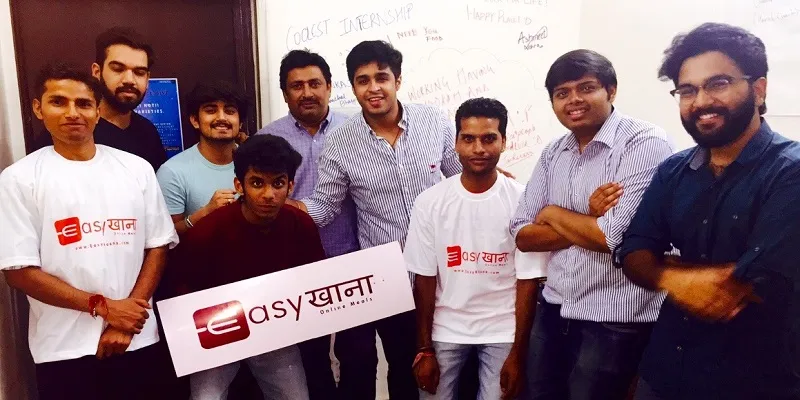EasyKhaana brings ghar ka khaana to corporates in Delhi and Gurgaon
Whether it is students studying away from home or techies working at software hubs, anyone who goes without homemade food for too long invariably starts missing it. Looking at the problem most of the people staying away from home face, friends Aayush Anand and Vishrut Gawri founded EasyKhaana in Delhi and Gurgaon.
It started with the concept of providing easily available, homely food to all. “We came up with the idea of serving homely food after seeing the unorganised sector of dabbawalas and corporate canteens. The market is huge but fragmented. We want to organise the market for ghar ka khaana,” says 22-year-old Aayush.

Beginning full stack
Starting in September this year from a one-room office, the trio built the idea and plan and roped in their friend Shubank Srivastava to help them with the technology. EasyKhaana operates on a centralised kitchen model and has a fleet of riders who work on logistics and delivery.
Being a tech product, all orders are placed on the website. Aayush says that the average ordering time on their website is 30 seconds.
Following the changing menu strategy, the team makes revenue on the sale of meal boxes. Customers can go online to order the meal they prefer for the day and it’s delivered to their location.
“For the first 20 days, we just got a total of four orders. The start was tough. But now, after three months, we are proud to say that we are catering to over 150 clients daily. We are seeing daily growth with repeat orders contibuting to at least 50 per cent,” adds Aayush.
Funding and future
He adds that believing in food-for-all concept, the team donates all the unsold food to the needy by three pm. The team has raised $100,000 from a private angel investor. The funding will be used for market expansions, product developments, technological advancements and improved delivery infrastructure.
Aayush says that the food delivery sector is $2-billion market that is growing at 30-40 per cent annually. However, he believes that their target customer is anybody who eats home cooked food. Aayush says their team is working towards changing the way people eat.
Speaking of the other players in the space, Aayush believes that their competitive edge is in the fact that they delivery hygienic, good quality food that is prepared in a centralised kitchen. “As we have a kitchen that is centralised and follows a hub-and-spoke model, we have control over the quality of the food,” he adds.
Also read: Is this the end of the honeymoon period for foodtech startups
YourStory take
It is a little early to say whether EasyKhaana falls under the me-too space or can actually create a differentiator. Many believe that with lesser entry barriers foodtech is a space most people want to enter into.
One of the others following a similar model is FreshMenu. However, the last few months haven’t been easy on the business of foodtech and food delivery with Dazo, Spoonjoy and Eatlo shutting down.
Even startups with deeper pockets like Tinyowl saw a rough patch this year and had to shut operations in few of the cities.
If you look at the amount of funding made in the foodtech space in the month of April alone, it was a whopping $74 million on a total of seven deals. In August, this dipped to $19 million with a total five deals. In September, this number further dropped to a total of two deals.
Seedfund Venture Partner and accomplished investor/mentor Sanjay Anandaram says that most of the technology-enabled food businesses are operations-intensive.
“Most of these app-based food businesses gain the initial traction in certain pockets of a city, but the same cannot be expected from all parts of the country,” he adds.
Many believe that food brings initial traction easily; the first 300 orders a day are easy to get. The trouble begins when the numbers go beyond 300 orders in a day.
The angel investment, Anand Lunia, Founder IndiaQuotient says, comes on the first 300 orders, but the remaining rounds of investment come from stability and sustainability as the number of orders increase.







